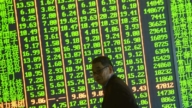【新唐人2013年08月29日訊】今年以來,中國地王大戰遍地開花,北京新地王的樓面單價已經高達4.4萬元/平方米。僅上半年,北京土地總收入就超過了664億元,如果把北京土地全部變賣就會遠超美國一年的GDP。目前,中國「鬼城」越來越多,很多地方房屋空置率也很高,但地王價格卻再創新高,造成這種怪象的背後原因是甚麼呢?請看報導。
中糧地產7月23號以23.6億拍下北京市孫河鄉的一塊地,它們次日發佈公告,這塊地用地規模75359.79平方米,建築控制規模81716平方米。
根據業界測算,扣除保障房面積後,這個地塊的樓面單價高達4.4萬元/平方米,成為北京新單價地王,遠超原來的2萬多元/平方米的單價。也就是說,在北京一個小指甲蓋兒大小的地都能賣到4塊多。
從整個中國來看,號稱是「地王年」的2009年、2010年與2013年相比,簡直就是小巫見大巫:不僅僅之前的地王價格峰值屢被突破,而且從數量上也是差的很遠。
北京市土地面積為16410.54平方公里,而上半年土地均價為8167元/平方米。假如將北京市土地全部變賣,可以賣到134萬億元人民幣,遠超美國100萬億的一年GDP總值。
美國南卡羅萊納大學艾肯商學院教授謝田:「造成這種荒謬的原因,其實至少有兩個,一個是中共政府繼續的亂印鈔票、爛發貨幣,造成中國嚴重的通貨膨脹。這是造成中國土地價格和房地產價格迅速飆漲的表面原因。」
美國南卡羅萊納大學艾肯商學院教授謝田進一步指出,造成這種怪象的背後原因是,中共權貴利益集團利用土地泡沫、利用通貨膨脹席捲中國老百姓的財富。
實際上,據《中國經濟週刊》旗下的智囊機構「中國經濟研究院研究」顯示,今年49個地王中,有將近一半的地王是被有央企背景的大型房企奪得。
北京師範大學MBA導師段紹譯:「它們只是名義上的企業,實際上相當於政府的一個部門。按著美國著名經濟學家弗裡德曼的說法,國企辦投資是花別人的錢,辦別人的事,它是既不講效果又不講節約。」
全球最大的空頭基金尼克斯掌門人、做空大師詹姆斯•查諾斯日前接受日本媒體採訪時表示,中國當下的房地產熱酷似1980年代後期的日本,巨大的房產泡沫規模無疑將載入歷史,並將對中國的實體經濟和金融體系產生沉重打擊。
查諾斯通過計算推測,從建設成本來看,中國房產市場的價值已升至GDP的300%~400%,而1989年日本的這一比例為375%。
段紹譯:「中國的房價泡沫非常嚴重,我預期,在未來兩年之內,這個泡沫應破滅。」
經濟學者段紹譯認為,當局通過人為的干預市場、壟斷土地獲利很多,但這是不能持續的。泡沫一旦破滅,房產投資者會血本無歸。
8月27號《日本商業報導網》發表題目為《向「鬼城化」急速邁進的中國》的文章。文章指出:「鬼城」遲早會在中國大規模出現。並且由於一些地方政府在開發時並未進行正確評估,許多地方出現不良債務,嚴重影響到地方經濟。
謝田表示,中共控制了所有的銀行、金融體系,老百姓儲蓄的錢都流入了央企和國企,它們不顧已經出現了幾十個「鬼城」,還在推高房地產泡沫。實際上,受害的只是老百姓。
採訪/易如 編輯/宋風 後製/葛雷
Beijing Land Prices Break All Records – Exceeding USA Annual GDP
Sky-high land prices are all the rage everywhere in China.
Beijing Xindiwang the real estate unit price reached
44,000 Yuan ($7,000) per square meter.
In the first six months, revenue from land sales in Beijing
exceeds 66.4 billion Yuan ($11 billion).
If Beijing sold all its land, it could generate a total amount
that is far exceeds the US annual GDP.
There are more and more ghost cities in China,
In many places the housing vacancy rate is very high.
However, land prices have increased to a record-highs.
What’s the reason behind this? Let’s take a look.
On July 23, Cofco Property spent 2.36 billion
Yuan ($385million) to buy land in Sunhe, Beijing.
Next day, they announced that the Sunhe plot has
an area of 75,360 sqm, the building area is 81,716 sqm.
Experts calculated that after deducting
the low-income residential zones,
the rest per unit price is 44,000 Yuan ($7,000) per
square meter which sets a new record for land prices.
It far exceeded the original price of 20,000 Yuan ($3,260)
per square meter.
It means that in Beijing, even a small fingernail-sized
area can be sold for more than 4 Yuan ($0.65)
In 2009 and 2010, land prices reached a record high,
but compared with 2013, it’s nothing.
The previous records are being constantly outstripped,
the numbers are astonishing.
In Beijing, the total land area is 16,410 square kilometers.
In the first six months, the average land price
was 8,167 Yuan ($1,334) per square meters.
If Beijing sells all its land, it can be sold for
134 trillion Yuan ($ 22 trillion),
which is far higher than the US annual GDP,
of 100 trillion Yuan ($16 trillion).
Xie Tian, Professor at Aiken School of Business,
University Of South Carolina: “At least two reasons caused this ridiculous phenomenon.
The CCP’s irresponsible printing and issuing of bank notes,
led to runaway land inflation.
This is the surface reason that has caused land prices
and housing prices to soar so quickly."
Xie Tian said that the CCP’s elite interests groups used the
land bubble and inflation to steal civilians’ wealth.
Actually, according to China Economic Weekly’s think tank,
research, amongst 49 record-high land prices,
50% of them are purchased by state-owned monopolies.
Duan Shaoyi, MBA tutor in Beijing Normal University:
“On the surface they look like free enterprises,
but in actuality they are the equivalent of
a governmental department.
According to famous US economist Milton Friedman,
state-owned enterprises take other people’s money,
and take other people’s business, and they are neither
economical nor efficient, nor interested in saving."
James Chanos, an American hedge fund manager and founder
of Kynikos Associates recently told Japanese media that
currently, Chinese real estate is very reminiscent of
Japan in the late 80s.
This is going to be one of the biggest bubbles of all time.
This will have a real impacts on the
Chinese banking system and the economy.
Chanos calculated and speculated that the value of all
residential real estate in China at construction cost is 300-400%
of GDP. It was 375% in Japan in 1989.
Duan Shaoyi: “China’s real estate bubble is very serious.
I speculate that the bubble will burst in the next two years."
Duan Shaoyi said that the authorities manipulated the market,
monopolized land to gain lots of personal advantages.
But this is not sustainable. Once the bubble bursts,
real estate investors will lose everything.
On August 27, Japanese media published an article
about “ghost town" China.
It said ghost towns largely appeared in China, because local
governments didn’t properly plan for development.
Many places are distressed because of debt,
seriously devastating the local economy.
Xie Tian said that the CCP controls all the
banks and financial sectors.
People’s deposits are siphoned off into central
and state-owned enterprises.
Ignoring the scores of ghost towns,
they are still creating more and more real estate bubbles.
But in actuality, only the civilians
are suffering and afflicted.



























